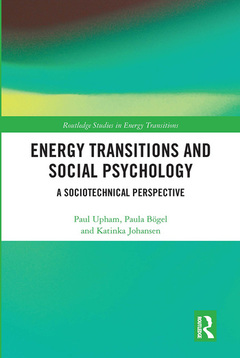Description
Energy Transitions and Social Psychology
A Sociotechnical Perspective
Routledge Studies in Energy Transitions Series
Authors: Upham Paul, Bögel Paula, Johansen Katinka
Language: English
Subjects for Energy Transitions and Social Psychology:
Keywords
UK Interviewee; Construal Level Theory; MLP Framework; Public Engagement; Sociotechnical Transitions Literature; Sociotechnical Transitions; Shale Gas; EV; Energy System; Sociotechnical Transitions Theory; Social Representations Theory; Grassroots Social Innovations; Fuel Cell; Battery Electric Vehicles; Sociotechnical Perspectives; Innovation Studies Literature; Energy Policy; Grassroots Innovations; UK Population; Shale Gas Fracking; Gazeta Wyborcza; Social Practice Theory; Shale Gas Exploitation; UK Broadsheet; Individual Level Reasons
50.12 €
In Print (Delivery period: 14 days).
Add to cartPublication date: 09-2020
· 15.6x23.4 cm · Paperback
216.65 €
In Print (Delivery period: 14 days).
Add to cartPublication date: 02-2019
· 15.6x23.4 cm · Hardback
Description
/li>Contents
/li>Biography
/li>
This book explains how social psychological concepts can be closely integrated with sociotechnical perspectives of energy transitions. It shows the value of actor-centred analysis that acknowledges the role of individual-level processes within their wider contexts of energy supply and use. In this way, the book connects social psychological and sociological frames of analysis, preserving the value of both, to provide multi-level, analytically extended accounts of energy transitions processes.
Sociotechnical thinking is about the interactions of people and technology, including the rules, regulations and institutions involved. Such perspectives help to identify the many forms of path dependency that can make change difficult. Human behaviour plays a strong role in maintaining these path dependencies, but it can also introduce change. This book advocates a deliberately interdisciplinary research agenda that recognises the value of social psychological perspectives when seeking to create new pathways for energy supply and use. At the same time, it also demonstrates the value of sociotechnical perspectives for energy-related social psychology.
Energy Transitions and Social Psychology will be of great interest to students and scholars of energy transitions, environmental and energy psychology, sustainable development and innovation studies, as well as students and scholars of environment and energy more generally.
List of Figures
List of Tables
List of Boxes
Preface
Acknowledgements
Author Biographies
Part I Rationale
1. Introduction
2. Social science approaches to energy technology acceptance and diffusion
3. How is social psychology currently used in the sociotechnical sustainability transitions literature?
4. Strong structuration as an integrating framework for psychological and sociological perspectives
Part II Case study applications
5. The psychology of expectations in sociotechnical systems
6. The role of social representations in sociotechnical transitions
7. The role of values in grassroots innovations
8. Socio-technical transition governance and public engagement
9. Conclusions and research directions
Appendix
Index
Paul Upham is Chair of Human Behaviour and Sustainable Development at Leuphana University, Germany, and Visiting Professor at the Copernicus Institute of Sustainable Development at Utrecht University, the Netherlands.
Paula Bögel is a post-doctoral researcher in the social psychology of energy transitions at the Chair for Human Behaviour and Sustainable Development at Leuphana University, Germany and of the research group Urban Analytics and Transitions at the Royal Institute of Technology (KTH), Stockholm, Sweden.
Katinka Johansen is a post-doctoral researcher in energy social science at the Chair for Human Behaviour and Sustainable Development at Leuphana University, and has recently completed a PhD in social psychology at the Technical University of Denmark.




